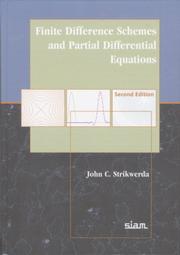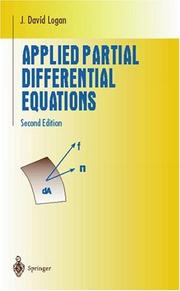| Listing 1 - 7 of 7 |
Sort by
|
Book

ISBN: 2730212213 Year: 2004 Publisher: St-Martin-d'Hères : Palaiseau : Cellule MathDoc - UMS 5638 (Université Joseph Fourier) Ecole Polytechnique,
Abstract | Keywords | Export | Availability | Bookmark
 Loading...
Loading...Choose an application
- Reference Manager
- EndNote
- RefWorks (Direct export to RefWorks)
Book
ISBN: 8524402164 Year: 2004 Publisher: Rio de Janeiro : Instituto de matemática pura e aplicada [Rio de Janeiro][I.M.P.A.],
Abstract | Keywords | Export | Availability | Bookmark
 Loading...
Loading...Choose an application
- Reference Manager
- EndNote
- RefWorks (Direct export to RefWorks)
Analytic spaces --- Complex manifolds --- Espaces analytiques --- Géometrie différentielle globale --- Variétés complexes --- Korteweg-de Vries equation. --- Korteweg-de Vries, Équation de --- Differential equations, Partial. --- Schrödinger equation. --- Équations aux dérivées partielles. --- Schrödinger, Équation de --- Equations aux derivees partielles --- Equations aux derivees partielles non lineaires --- Equations d'evolution
Book
Abstract | Keywords | Export | Availability | Bookmark
 Loading...
Loading...Choose an application
- Reference Manager
- EndNote
- RefWorks (Direct export to RefWorks)
Mathematiques --- Equations differentielles ordinaires --- Equations aux derivees partielles --- Physique --- Fonctions d'une variable complexe --- Oeuvres reunies --- Optique --- Fonctions entieres --- Bureau, Florent --- Mathematiques --- Equations differentielles ordinaires --- Equations aux derivees partielles --- Physique --- Fonctions d'une variable complexe --- Oeuvres reunies --- Optique --- Optique geometrique --- Fonctions entieres

ISBN: 0898715679 Year: 2004 Publisher: Philadelphia : Society for Industrial and Applied Mathematics,
Abstract | Keywords | Export | Availability | Bookmark
 Loading...
Loading...Choose an application
- Reference Manager
- EndNote
- RefWorks (Direct export to RefWorks)
Differential equations, Partial --- Finite differences --- Equations aux dérivées partielles --- Différences finies --- Numerical solutions --- Solutions numériques --- Finite differences. --- Numerical solutions. --- Equations aux dérivées partielles --- Différences finies --- Solutions numériques

ISBN: 0130652431 9780130652430 Year: 2004 Publisher: Upper Saddle River, N.J.: Pearson/Prentice Hall,
Abstract | Keywords | Export | Availability | Bookmark
 Loading...
Loading...Choose an application
- Reference Manager
- EndNote
- RefWorks (Direct export to RefWorks)
Boundary value problems. --- Differential equations, Partial. --- Fourier series. --- Boundary value problems --- Differential equations, Partial --- Fourier series --- 517.95 --- 517.95 Partial differential equations --- Partial differential equations --- Fourier integrals --- Series, Fourier --- Series, Trigonometric --- Trigonometric series --- Calculus --- Fourier analysis --- Harmonic analysis --- Harmonic functions --- Boundary conditions (Differential equations) --- Differential equations --- Functions of complex variables --- Mathematical physics --- Initial value problems --- Équations aux dérivées partielles

ISBN: 0387004440 9780387004440 9780387216874 9786610188918 128018891X 0387216871 Year: 2004 Volume: 13 Publisher: New York, N.Y. Springer
Abstract | Keywords | Export | Availability | Bookmark
 Loading...
Loading...Choose an application
- Reference Manager
- EndNote
- RefWorks (Direct export to RefWorks)
Partial differential equations (PDEs) are fundamental to the modeling of natural phenomena, arising in every field of science. Consequently, the desire to understand the solutions of these equations has always had a prominent place in the efforts of mathematicians; it has inspired such diverse fields as complex function theory, functional analysis, and algebraic topology. Like algebra, topology, and rational mechanics, PDEs are a core area of mathematics. This book aims to provide the background necessary to initiate work on a Ph.D. thesis in PDEs for beginning graduate students. Prerequisites include a truly advanced calculus course and basic complex variables. Lebesgue integration is needed only in chapter 10, and the necessary tools from functional analysis are developed within the coarse. The book can be used to teach a variety of different courses. This new edition features new problems throughout, and the problems have been rearranged in each section from simplest to most difficult. New examples have also been added. The material on Sobolev spaces has been rearranged and expanded. A new section on nonlinear variational problems with "Young-measure" solutions appears. The reference section has also been expanded.
Partial differential equations --- Differential equations, Partial. --- Equations aux dérivées partielles --- Differential equations, Partial --- Mathematics --- Physical Sciences & Mathematics --- Calculus --- 517.95 --- 517.95 Partial differential equations --- Mathematics. --- Partial differential equations. --- Applied mathematics. --- Engineering mathematics. --- Physics. --- Partial Differential Equations. --- Applications of Mathematics. --- Mathematical Methods in Physics. --- Appl.Mathematics/Computational Methods of Engineering. --- Differential equations, partial. --- Mathematical physics. --- Mathematical and Computational Engineering. --- Natural philosophy --- Philosophy, Natural --- Physical sciences --- Dynamics --- Engineering --- Engineering analysis --- Mathematical analysis --- Differential equations. --- Differential Equations. --- Mathematical and Computational Engineering Applications. --- Data processing.

ISBN: 0387209352 0387209530 1441988793 Year: 2004 Publisher: New York : Springer,
Abstract | Keywords | Export | Availability | Bookmark
 Loading...
Loading...Choose an application
- Reference Manager
- EndNote
- RefWorks (Direct export to RefWorks)
This primer on elementary partial differential equations presents the standard material usually covered in a one-semester, undergraduate course on boundary value problems and PDEs. What makes this book unique is that it is a brief treatment, yet it covers all the major ideas: the wave equation, the diffusion equation, the Laplace equation, and the advection equation on bounded and unbounded domains. Methods include eigenfunction expansions, integral transforms, and characteristics. Mathematical ideas are motivated from physical problems, and the exposition is presented in a concise style accessible to science and engineering students; emphasis is on motivation, concepts, methods, and interpretation, rather than formal theory. This second edition contains new and additional exercises, and it includes a new chapter on the applications of PDEs to biology: age structured models, pattern formation; epidemic wave fronts, and advection-diffusion processes. The student who reads through this book and solves many of the exercises will have a sound knowledge base for upper division mathematics, science, and engineering courses where detailed models and applications are introduced. J. David Logan is Professor of Mathematics at University of Nebraska, Lincoln. He is also the author of numerous books, including Transport Modeling in Hydrogeochemical Systems (Springer 2001).
Differential equations, Partial. --- Equations aux dérivées partielles --- 517.95 --- Partial differential equations --- Mathematics. --- Community ecology, Biotic. --- Partial differential equations. --- Physics. --- Partial Differential Equations. --- Mathematical Methods in Physics. --- Community & Population Ecology. --- 517.95 Partial differential equations --- Equations aux dérivées partielles --- Differential equations, Partial --- Biocenoses --- Biocoenoses --- Biogeoecology --- Biological communities --- Biomes --- Biotic community ecology --- Communities, Biotic --- Community ecology, Biotic --- Ecological communities --- Ecosystems --- Natural communities --- Ecology --- Population biology --- Natural philosophy --- Philosophy, Natural --- Physical sciences --- Dynamics
| Listing 1 - 7 of 7 |
Sort by
|

 Search
Search Feedback
Feedback About UniCat
About UniCat  Help
Help News
News